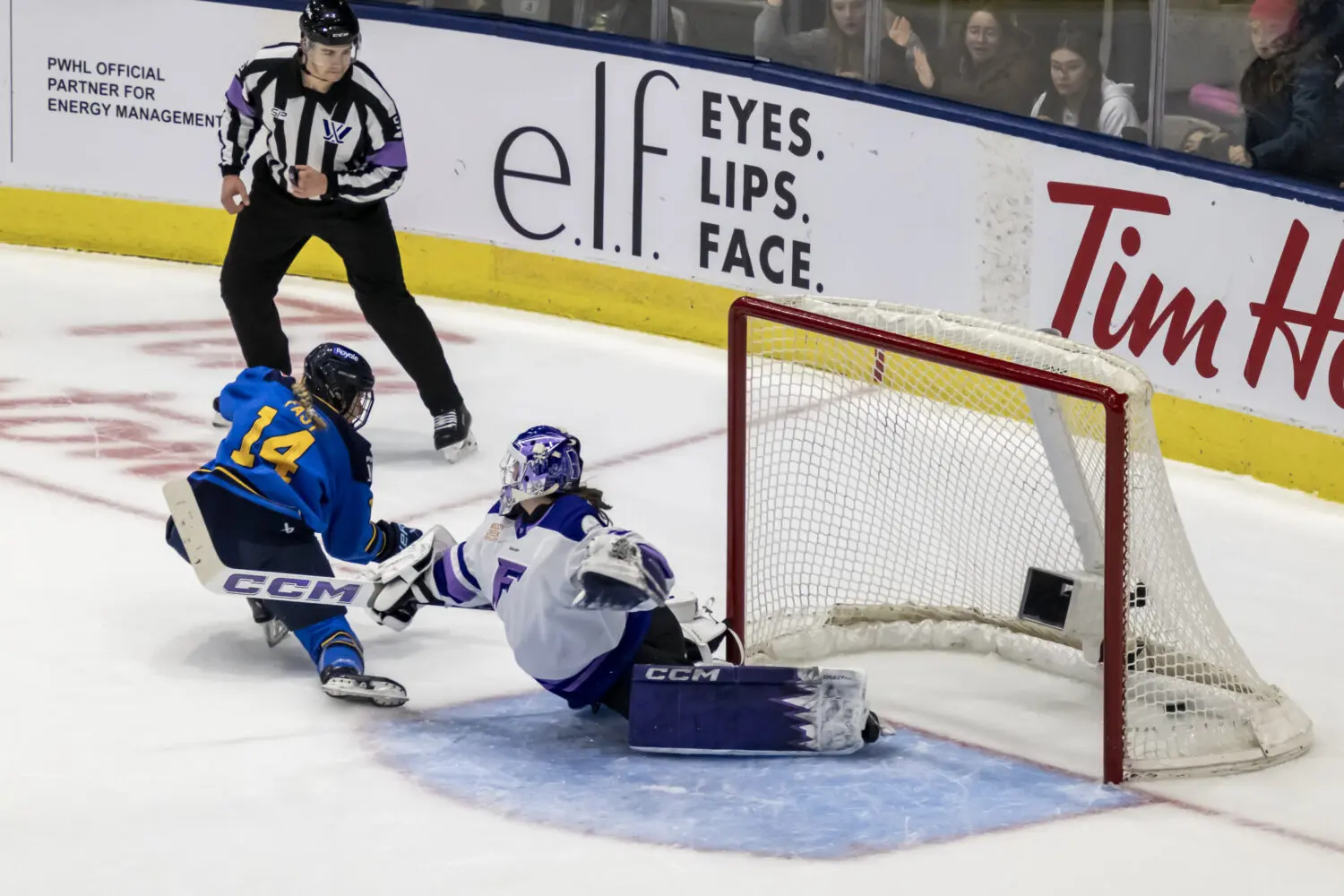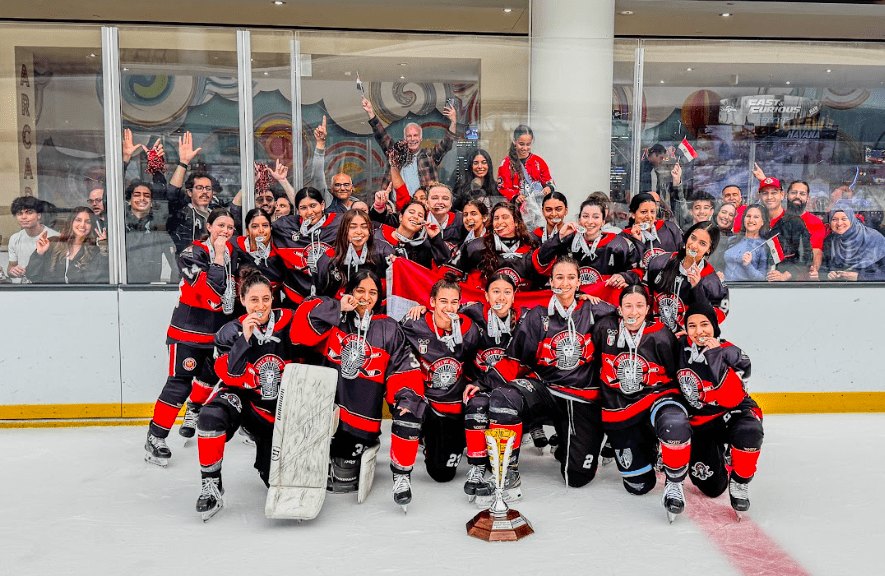
At first glance, the University of Connecticut and the region of Planegg, Germany, may not seem to have that much in come – that is, until you take a look at their female hockey players. Several graduates of the University of Connecticut women’s hockey program have played for the ESC Planegg Penguins following graduation, the two most recent being Caitlin Hewes and Brittany Berisoff.
Hewes and Berisoff met each other at the University of Connecticut, Hewes a defender from Stillwater, Minnesota, and Berisoff a forward from Kelowna, Canada. During their senior year two of their former teammates, Sarah MacDonnell and Kayla Campero, played for the Planegg Penguins, which helped spark Hewes and Berisoff’s interest in playing overseas.
“I’d talked about it a bit my junior year because of Sarah and Kayla and I knew that this was something that they were going to do,” said Hewes. “Then when they were over here my senior year and telling us how amazing it was, it just kind of set it in stone that this was something that we wanted to do.”
 Hewes and Berisoff are now over two months into the season with the Penguins, a team based near Munich. The Penguins compete in the seven-team Deutsche Frauen Eishockey Bundesliga, the highest level of women’s hockey in Germany. They also compete in the Elite Women’s Hockey League (EWHL) Supercup, which is composed of teams from Germany, Hungary, Austria, Slovakia, and Kazakhstan.
Hewes and Berisoff are now over two months into the season with the Penguins, a team based near Munich. The Penguins compete in the seven-team Deutsche Frauen Eishockey Bundesliga, the highest level of women’s hockey in Germany. They also compete in the Elite Women’s Hockey League (EWHL) Supercup, which is composed of teams from Germany, Hungary, Austria, Slovakia, and Kazakhstan.
The Penguins are on track to having a very successful season. They are currently tied for the top position in the Deutsche Frauen Eishockey Bundesliga, with five wins and one loss.
“Beginning of the season we set a goal to win the German Bundesliga,” explained Hewes. “So far we have only lost one game in our German league and that was this weekend to Ingolstadt, who is I think supposed to be one of our biggest rivals. So we’re 1-1 with them so far and we’re 2-0 with another one of the really good teams, Memmingen, so I think we are doing very well to reach our goals and playing some good games.”
 In their first six games in the Deutsche Frauen Eishockey Bundesliga, Hewes and Berisoff have contributed to the scoresheet several times. Berisoff has three assists and Hewes has one goal and one assist. In four other games against non-German teams in the EWHL Supercup, Berisoff has two goals and one assist and Hewes has one assist.
In their first six games in the Deutsche Frauen Eishockey Bundesliga, Hewes and Berisoff have contributed to the scoresheet several times. Berisoff has three assists and Hewes has one goal and one assist. In four other games against non-German teams in the EWHL Supercup, Berisoff has two goals and one assist and Hewes has one assist.
The Penguins play most of their games in Germany, often travelling to other German cities for a weekend of games. The rest of the time they play at their home rink, which is built half outside and half inside, a building method that results in water puddles after ice cleanings and extreme fog (but which also gives the rink its own charm and character).
As the only imports on the team, Hewes and Berisoff have had to adjust to several things over their first two months in Germany, from the time change to the recycling system, and they have noticed several differences between Germany and North America. In terms of hockey, the main difference has been in the style of play.
“Playing D1 [with the University of Connecticut] I think it was a lot more rough and I think you can get away with a lot of more things, whereas here if you kind of play like that you’ll get a penalty right away,” noted Berisoff. “It’s more physical in college I think and here it’s much more [focused on] skills, a lot more stickhandling.”
 The focus on skills is something Berisoff and Hewes have also noticed during practices.
The focus on skills is something Berisoff and Hewes have also noticed during practices.
“Stickhandling is something that they make a point to practice on these teams, whereas I don’t think we did like a single straight down the ice stickhandling drill all through college,” said Hewes.
Hewes and Berisoff have had to adapt to other differences too, such as the fact that in Germany their teammates don’t live close together, so a lot of game and practice preparation is done individually at home (in college hockey, team members live together in dorms and do almost everything together). But the main challenge has been the fact that everything – from practices to pre-game speeches – is conducted in German.
“We didn’t know any German coming in here,” said Berisoff. “At our first few practices we had no idea what our coach was saying … the girls are really helpful and they’re always telling us what we missed or what was important that he said, but its definitely been a struggle with the language.”
But despite the challenges, Hewes and Berisoff are learning the basics of German, and will no doubt continue to as the months go on. They make a point to talk to their coach if they don’t understand what has been said and are forming good relationships with their teammates. The team, which is made up of players ranging from age 16 to age 35, gets along well and creates a positive atmosphere in the dressing room.
“I would think personally that [for] a 35 year old and a 16 year old that it would be kind of weird to be on the same team, but everybody seems to get along and click in the locker room, and … we have a really good team dynamic,” said Hewes.
Hewes and Berisoff may be almost 6,300 km away the North American hockey culture that they know at the University of Connecticut, but this experience is proving to be very valuable and worthwhile. It is an experience in which they not only get to play a game that they love on the other side of the world, but in which they also get to explore new places and experience living in another culture.
“It’s one thing to go travel somewhere, but you still do everything as you would as a Canadian or American,” said Berisoff. “But when you actually live in a place you have to adapt and start living in this other culture and do as they do and you learn way more than if you’re just here for a week.”
For more information on the ESC Planegg Penguins, please visit www.esc-planegg.de. For more information on playing women’s hockey overseas, please visit www.whlprofile.com.
Images courtesy of Caitlin Hewes and Brittany Berisoff.
[adrotate group=”1″]
Related Articles
Categories
Recent Posts
[adrotate group=”2″]




